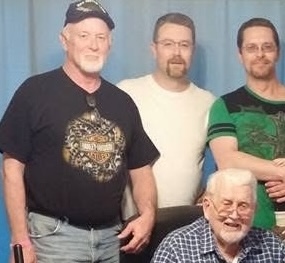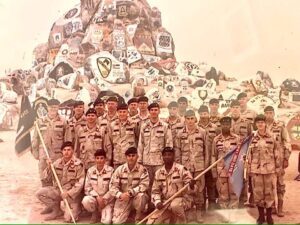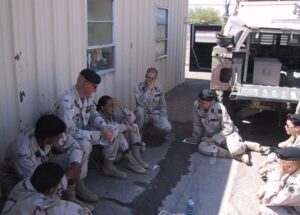Specialist Jeremy Carroll, U.S. Army – From Training Troops at Fort Irwin to Collecting Intelligence in the Iraq War
America’s fighting forces are the best in the world. They earned that distinction by training day in and day out, preparing them for victory on the battlefield. Specialist Jeremy Carroll, U.S. Army, knows the importance of training better than most because he trained thousands of soldiers destined for combat in Afghanistan and Iraq. When his own turn came to deploy in 2003, he saw firsthand the benefits of realistic training and incorporated his experience into the lessons he passed on to others. As a result, his service had a positive impact on countless U.S. Army units and soldiers deployed around the world.
Jeremy was born in 1980 in West Berlin, an island of democracy surrounded by communist East Germany. His father was a U.S. Army staff sergeant stationed there during the Cold War with the Soviet Union. After West Berlin, Jeremy moved with his parents and older brother to Fort Knox, Kentucky, where Jeremy’s father was a drill sergeant. When Jeremy was almost six years old, his father left the Army and moved the family from Fort Knox to Springfield, Illinois, where they put down permanent roots.
 Jeremy Carroll (white shirt) surrounded by his father (left), brother (right), and late grandfather (bottom right). All are veterans.
Jeremy Carroll (white shirt) surrounded by his father (left), brother (right), and late grandfather (bottom right). All are veterans.Jeremy attended Lanphier High School where he ran cross country and wrestled until his senior year. To earn spending money during the summers, he detasseled corn on nearby farms. He also started planning his future, which, by the time he was a junior, he knew would include a stint in the Army. By joining the Army, he would be following not only in his father’s footsteps, but also in the footsteps of his older brother, his maternal and paternal grandfathers, and numerous other relatives. The Army also offered education benefits to allow him to pay for college, which he intended to enroll in after serving out his enlistment.
To follow through with his plan, Jeremy visited an Army recruiter during his senior year. He told the recruiter his older brother was a cryptologic linguist who analyzed and interpreted foreign language communications, and he wanted to do that, too. Because Jeremy spoke some Spanish, the recruiter said he could make it happen and guaranteed Jeremy a slot in the cryptologic linguist MOS (Military Occupational Specialty). However, because Jeremy was only seventeen, his parents had to give their written permission for him to enlist. They did so after he graduated from high school in June 1998.
Once Jeremy’s enlistment papers were signed enrolling him in the Army’s Delayed Entry Program, he had to wait until November to report for active duty. In the meantime, he worked at a local grocery store to earn some spending money. When his November report date finally arrived, he took a Greyhound bus to the Military Entrance Processing Station in St. Louis, Missouri, where he passed his final physical and took his oath of enlistment. Then he and the other new recruits like him boarded an Army bus on their way to basic training.
The bus arrived at Fort Leonard Wood in Missouri, or as the recruits dubbed it, “Fort Lost in the Woods in Misery,” late in the afternoon on Friday the 13th. Although the drill instructors were waiting for them, the intense basic training experience did not begin until the following Monday. Jeremy fared well during basic training because his father had been a drill instructor and told Jeremy what to expect. This cut both ways, though, after Jeremy posted a photo of his father in uniform on his wall locker. From that point on, Jeremy’s drill instructors were harder on him because they knew he knew too much about their methods and objectives.
Basic training helped Jeremy get into the best shape of his life. He arrived a wiry 155-pound runner and graduated a 180-pound muscular soldier. He also gained confidence as the drill instructors pushed him and the other recruits to their limits, making sure they would be able to handle the pressure-packed situations they were sure to encounter during their Army careers. Although Jeremy hated being pushed at the time, he accepted it as an important part of the drill instructors’ job and tried not to let it bother him.
Jeremy graduated from basic training in January 1999 and reported to follow-on training at the Defense Language Institute (DLI) Foreign Language Center (FLC) in Monterey, California. There he began a six-month course honing his Spanish language skills. At one point during the course, he needed to take care of some family matters, so he was temporarily assigned to the DLI’s casual detail, where he worked with staff managing personnel who had to be given temporary work assignments due to injury or illness. He even accompanied a chaplain on casualty calls to the family members of servicemembers who had died. The interruption of his studies meant he had to restart his six-month Spanish language course during the summer.
Despite this delay, Jeremy enjoyed the language program. He especially valued getting to meet and work with officers and enlisted members from the other military branches, each bringing unique experiences and perspectives into the classroom. His instructors, who hailed from Guatemala, Nicaragua, Colombia, and Mexico, added authenticity to the course because they were native Spanish speakers, each with their own accents and dialects to decipher. Jeremy even picked up a little Portuguese by talking to a student from Brazil and got to tour a tall ship that a foreign navy sailed into Monterey Bay.
Jeremy graduated from the DLI FLC in January 2000 and moved on to the next phase of his training at Goodfellow Air Force Base in San Angelo, Texas. There he learned to operate the equipment he needed in his role as a cryptologic linguist. After Goodfellow, he transferred to Fort Huachuca, Arizona, for training on additional equipment he would use in the field.
After successfully completing his training in November 2000, Jeremy reported to his permanent duty station at the Fort Irwin National Training Center (NTC). The NTC’s location in Southern California’s Mohave Desert made it ideal for preparing Army units to fight and win conflicts taking place in harsh desert environments. Jeremy’s role at the NTC was to serve as one of the trainers. More specifically, he was assigned to the 511th Military Intelligence Company of the Regimental Support Squadron to the 11th Armored Cavalry Regiment. The company’s mission, as was the mission of the entire 11th Armored Cavalry Regiment, was to play the role of military forces opposing the U.S. Army units rotating through the NTC at Fort Irwin for training.
 Jeremy and his platoon in front of Painted Rock at Fort Irwin
Jeremy and his platoon in front of Painted Rock at Fort IrwinAs a cryptologic linguist, Jeremy helped make the training as realistic as possible. To do so, he and the other members of his unit would do things like broadcast Spanish language radio communications and masquerade as civilians in some of the training scenarios. To make it even more real, Jeremy and his colleagues were permitted to grow their hair and dress the part, so they looked like civilians from a foreign country rather than U.S. Army soldiers.
Jeremy loved his assignment, especially since he knew he was training his fellow soldiers on how to survive in the event they found themselves in harm’s way. He found it fun, too, sometimes like a big game of laser tag. This was because Jeremy’s opposition forces and the U.S. Army forces being trained engaged each other with laser training weapons during exercises. When sensors worn by individuals or placed on vehicles lit up indicating they had been successfully targeted by a laser, the affected individuals were designated casualties and taken out of action. For Jeremy’s opposition forces, getting “killed” meant they could pull a grill out of their vehicles and cook some hamburgers and hotdogs in the desert while the exercise scenario continued. In contrast, the Army units being trained had to react to the incident just like they would on an actual battlefield by evacuating any wounded soldiers and retrieving damaged equipment.
Every July and December, the tables turned, and Jeremy’s unit became the unit being trained. This meant the members of Jeremy’s unit had to practice driving and maneuvering their vehicles loaded with intelligence collection equipment in the desert, setting up tactical operations centers, and defending their positions against other units playing opposition forces. In short, they had to make sure they could live up to the same standards they enforced on others.
Ten months into his assignment with the 511th Military Intelligence Company, Jeremy’s team was at the NTC pool conducting drown-proof training. The training required the soldiers to jump into the pool wearing their uniforms and then keep themselves afloat until they were told they could get out of the water. In the middle of the session, the first sergeant overseeing the test told them the World Trade Center had just been attacked. From that point on, life at NTC changed. The most immediate change was the Army restricted access to the base, making it at first impossible and then difficult for anyone other than a military member to enter. More importantly, the training Jeremy and the other members of the opposition forces conducted took on added significance because everyone knew the units being trained could be on their way to Afghanistan to avenge the 9/11 attacks.
In the February/March timeframe of 2003, Jeremy and eleven other members of the 511th Military Intelligence Company were selected to augment the 66th Military Intelligence Company supporting the 3rd Armored Cavalry Regiment at Fort Carson, Colorado. There he found himself reporting to a soldier he had trained at Fort Irwin, which made him feel proud that his efforts had helped her excel and advance. Jeremy and the other eleven augmentees trained with the 66th Military Intelligence Company and deployed with the unit on April 4, 2003, to take part in the war in Iraq.
The company’s initial stop on its deployment was in Kuwait, where it waited for its equipment and orders. From there it went to Ramadi in central Iraq, just sixty-eight miles west of Baghdad. Jeremy and other soldiers from the unit were then directed to operate out of Fallujah, a city located about midway between Ramadi and Baghdad. Their camp was inside the city limits in a walled compound that had previously been used as a resort for Ba’ath Party members.
 Jeremy and members of his platoon waiting for their next training mission at Fort Irwin
Jeremy and members of his platoon waiting for their next training mission at Fort IrwinJeremy’s primary duty involved collecting intelligence to support allied military operations. This included driving through the surrounding area collecting communications intelligence using mobile equipment carried on his vehicle. During these excursions, Jeremy and his teammates were frequently shot at by insurgents seeking to disrupt their activities. Jeremy also spoke with local people in the towns and villages he visited, gaining their trust and insight, and participated in interrogating detainees. After collecting the intelligence, Jeremy and his teammates prepared written reports documenting what they learned, which they then delivered in person to the headquarters element of the 66th Military Intelligence Company in Ramadi. Jeremy routinely came under fire during these trips to and from Ramadi. Although he had some close calls, he was never injured.
Despite being in constant danger during his time in Iraq, Jeremy enjoyed meeting and talking to the Iraqi people and learning about their culture. Although some of the Iraqis were hostile, he found most to be very nice and respectful, mainly interested in peacefully getting on with their lives and taking care of their families. He also enjoyed interacting with allied forces and remembers talking with members of an Australian unit passing through Fallujah. He found them just like the members of his own unit—excited about their mission and wanting to do a good job—but speaking with an accent and having different life experiences growing up. Still, the camaraderie and bonds of military service connected them. He even got the chance to practice his Spanish skills with an engineer he met who was checking out the structural integrity of a nearby dam.
Jeremy also found beauty in the otherwise desolate Iraqi landscape, especially as the sun set each night in the western sky. Driving through one town whose sole color was that of sand, he saw a man’s finely pruned rose garden with stunning red flowers adding accent to the monocolor background. Even the desert temperature provided stark contrast, with stifling 110-degree days giving way to seemingly frigid 80-degree nights.
By the beginning of June 2003, the 66th Military Intelligence Company had done all it could in support of the U.S. war effort, and it redeployed to the United States. Jeremy and the other eleven members of the 511th Military Intelligence Company then returned to their roles at Fort Irwin training Army units to prepare them for combat. However, as a result of the wars in Afghanistan and Iraq, the training changed from emphasizing maneuver warfare in the desert to dealing with insurgents in cities and towns.
Jeremy saw the change in emphasis as an opportunity to inject his recent experience in Fallujah into the training. He suggested his unit do things like portray protests in the mockups of the towns and throw things like water balloons at the soldiers being trained so they would learn how to handle tense situations simmering on the edge of violence. Unaware of Jeremy’s recent experience, his company commander was skeptical and asked Jeremy how he knew these were the kind of things soldiers would have to face when they deployed. Another soldier replied, “He just got back from Iraq, sir.” That was good enough for the company commander, and he gave Jeremy and the others who deployed with him the creative license they needed to implement their ideas.
In November 2003, Jeremy’s five-year enlistment ended. He thought about reenlisting but decided instead to move on. After receiving his honorable discharge, he returned to Springfield, Illinois, to pick up where he left off in 1998. He started by taking electronics technology courses at Lincoln Land Community College during the day and working as a night auditor at a hotel on nights and weekends. After two years at the hotel, he transitioned to security work, including at the grocery store where he had worked the summer before reporting for basic training.
After the grocery store, Jeremy found his calling working with special needs kids in his local school district. He is certain the kids saved his life, helping him overcome PTSD from his time in Iraq. He reasoned if these kids could deal with their disabilities for their entire lives, he could deal with his disability for the rest of his. He worked with the kids for thirteen years and still returns to the school to visit the kids and staff for inspiration and support. Now Jeremy works at Camp Butler National Cemetery northwest of Springfield, helping maintain that hallowed ground for veterans and their families. Jeremy has several relatives buried at the cemetery but considers all the veterans buried there to be part of his family.
Jeremy’s support of veterans goes beyond his day job. He is an active member of the Veterans of Foreign Wars (VFW) La Fore Lock Post 755, where he serves as a member of the post’s color guard and as its chaplain.
Voices to Veterans is proud to salute Specialist Jeremy Carroll, U.S. Army, for his distinguished service to our country. In addition to providing realistic training to his fellow soldiers to help them win on the battlefield, he deployed to Fallujah during the Iraq War and developed intelligence that saved American and allied lives. He continues to serve both at work and through the VFW, helping veterans and their families in Central Illinois. We thank him for all he has done and wish him fair winds and following seas.
If you enjoyed Jeremy’s story, please sign up for the Voices to Veterans Spotlight monthly newsletter by clicking here. Once each month, you’ll receive a new written veteran’s story directly in your mailbox. Best of all, it’s free and you can unsubscribe at any time.
The post Specialist Jeremy Carroll, U.S. Army – From Training Troops at Fort Irwin to Collecting Intelligence in the Iraq War first appeared on David E. Grogan.



